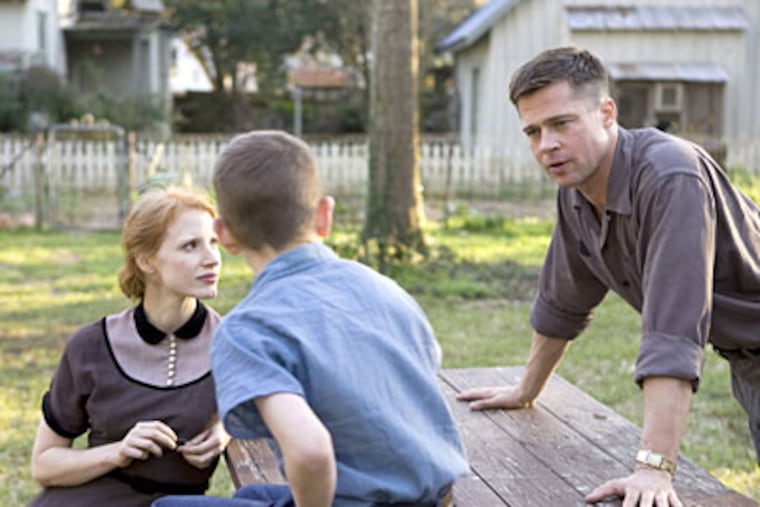A Malick meditation on the whole of life
It's practically a miracle that Terrence Malick keeps making movies. Since Badlands, his 1974 debut, the press-shy writer-director has worked, with purpose and poetry, way off Hollywood's beaten path. His reliance on voice-over narration, his use of light and image - rapturous shots of animals and fields, people framed ben

It's practically a miracle that Terrence Malick keeps making movies.
Since Badlands, his 1974 debut, the press-shy writer-director has worked, with purpose and poetry, way off Hollywood's beaten path. His reliance on voice-over narration, his use of light and image - rapturous shots of animals and fields, people framed beneath wide, arching skies - and a sense of a world spinning into eternity, where the actors strike their poses, dressed as outlaws or farmers, soldiers or explorers, without having much to say. . . . This is the last man Universal's going to call to make Fast and Furious 15.
There are other American filmmakers who have managed to go their own way: Woody Allen, for one, whose prolific output makes him the proverbial hare to Malick's tortoise. But Allen mostly serves up diversions, amusements. There's nothing wrong with Midnight in Paris - it's charming, with a clever conceit - but it's not going to change your life.
The Tree of Life, Malick's fifth and most ambitious undertaking, not only aspires to change your life - it tries to explain it, from the first cosmic blip to those busy amoebae splitting and multiplying, to jellyfish jellying through the primal seas, to the planets lined up in a row. And did we say Brad Pitt and Sean Penn star in this thing?
Set in 1950s Texas - when it's not jumping back to Jurassic riverbeds, or whooshing through the cosmos - The Tree of Life follows a simple and handsome American family as they do simple and handsome things. Pitt is the father, working as a manager at a big plant. His fierce temper and aching restlessness can get the better of him, delivering the worst on his wife (Jessica Chastain, who could have been Andrew Wyeth's muse if she had time-traveled down the Brandywine) and three boys. Their lives go by like a Flickr slideshow: balloon-tire bikes wheeling down shaded side streets, a baseball bat whacking at a ball, a toddler wobbling his first steps, the billowing curtains and neat bedspreads, sun rays and shadow playing like ghosts on a wall.
Pitt is the provider, the hunter-gatherer, only it's the era of Ike and big cars, TVs and DDT (there's a haunting shot of neighborhood kids, all innocence and play, losing themselves in the fog of a City of Waco truck as it rolls down the street spraying insecticide). His nature is Man's, his wife's is grace. Chastain's character has less to say than even Pitt's, who lets loose with the occasional dinner-table lecture. She is there to embody motherhood and beauty, floating (in one scene, literally) above the woes and worries of the world. And woes and worry befall this family: money problems, job problems, a jarring death.
Cut to present day, and the glass skyscrapers of a city where Jack (a brooding, crosshatched Penn), one of Pitt and Chastain's three Texas sons, now works as an architect, contemplating his existence. He looks like he wants to turn it all in for something else, and looks through the floor-to-ceiling panes with a pained expression, somewhere between sorrow and regret. And look is the operative verb: If Penn has more than a dozen words in The Tree of Life, I missed them.
(There's an amusing Q&A with Christopher Plummer, hired by Malick for The New World, in this week's New York magazine. Plummer gripes about Malick's penchant for cutting his actors out of his movies. Adrien Brody, completely gone from The Thin Red Line, Plummer hardly in The New World. Malick, says the actor, is "fascinated by nature, and just cuts to birds.")
Still, somehow, The Tree of Life - impressionistic, revelatory, elliptical - works. The moons of Jupiter, a butterfly cupped in a hand, a dog scampering down the sidewalk, kids breaking a window, the seven white buttons going up the neckline of Chastain's dress - everything aligns. The scenes with the dinosaurs (yes, dinosaurs!) are goofy, sure, but have you ever cared so much about the emotional life of a raptor before?
And when a whole parade of people, living and dead, forgotten and remembered, crisscross along a beach as The Tree of Life reaches its cosmic coda, well, it's more like a new-agey commercial for life insurance than a meditation on the eternal soul.
But somewhere back there in this amazing cinematic opus, Chastain's matriarchetype has this to say: "Unless you love, your life will flash by."
Which is kind of transcendent, and kind of Zen, and kind of corny - and definitely something to think about.